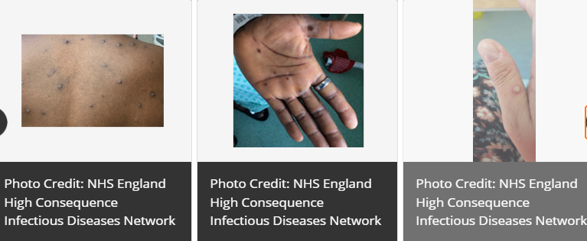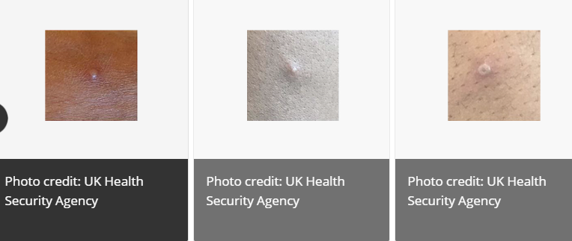Mpox (Monkeypox)

Learn the signs and symptoms of Mpox and how to prevent its spread
Mpox is a rare disease that can make you sick. People with mpox develop a rash which may be located on or near the genitals (penis, testicles, labia, and vagina) or anus (butthole) and could be on other areas like the hands, feet, chest, face, or mouth. The rash can initially look like pimples or blisters and can last up to 2-4 weeks. Mpox does not usually cause serious illness; however, it can result in hospitalization or death.
If you are a healthcare provider, be alert for patients who have a rash consistent with mpox regardless of other factors such as recent travel, gender, or sexual orientation. Tennessee Department of Health (TDH) is committed to working with you to identify and care for individuals with mpox.
What do you need to know about mpox?
Who is at risk of contracting mpox?
Mpox is primarily spread through close, physical contact between people. This means anyone can get mpox. However, based on the current outbreak, certain populations are being affected more than others, including men who have sex with men.
Based on previous outbreaks, some groups may be at heightened risk for severe outcomes if they contract mpox. This includes people with weakened immune systems, elderly Tennesseans, and pregnant people.
| What are the symptoms of mpox? |
|---|
• Rashes, bumps, or blisters on or around the genitals or in other areas like your hands, feet, chest, or face. • Flu-like symptoms such as: • These symptoms may occur before or after the rash appears, or not at all. |
| How does mpox spread? |
|---|
• Close, physical contact between people including: • Direct contact with mpox sores or rashes on an someone who has mpox. • Respiratory droplets or oral fluids from someone with mpox, particularly for those who have close contact with someone or are around them for a long period of time. • It can also be spread through contact with objects or fabrics (e.g., clothing, bedding, towels) that have been used by someone with mpox. |
| How can I protect myself? |
|---|
• Ask your sexual partners whether they have a rash or other symptoms consistent with mpox. • Avoid skin-to-skin contact with someone who has a rash or other mpox-related symptoms. • If you are exposed or experience symptoms, make sure to reach out to a health care provider. • Consider getting vaccinated against mpox • Follow trusted sources of health information, including TDH, CDC, and your local county health department. |
What does an mpox rash look like?
What should I do if I was exposed or have mpox symptoms?
Tennesseans who experience symptoms consistent with mpox, such as characteristic rashes or lesions, should contact their health care provider. See additional resources below.
Resources
- What to do if you’ve been exposed – English | Spanish
- What to do if you’ve been tested – English | Spanish
- What to do if you’re a case – English | Spanish
Community Resources
Mpox Handout: What All Tennesseans Should Know – English | Spanish
Mpox Interim Guidance for Childcare
Mpox Interim Guidance for Schools
Mpox Interim Guidance for Congregate Living Settings
Additional Information from the Centers for Disease Control and Prevention (CDC)
Prevention in Specific Settings
What you need to know about the mpox vaccine in Tennessee.
When properly administered before or soon after exposure, vaccines can help protect against mpox illness.
The vaccine most commonly used for preventing mpox infection is JYNNEOS (also known as Imvamune or Imvanex) which has been licensed by the U.S. Food and Drug Administration (FDA), and distributed to health departments by the Department of Health and Human Services (HHS).
People who get vaccinated should continue to protect themselves from infection by avoiding close, skin-to-skin contact, including intimate contact, with someone who has mpox.
Data on JYNNEOS can be found on the CDC website .
The CDC has also made available the live replicating smallpox vaccine ACAM2000. However, this vaccine has several characteristics that may make it unsuitable for use in the current context, including considerably greater risk to the recipient compared with JYNNEOS. Data on ACAM2000 can be found on the CDC website.
Who is eligible for the JYNNEOS vaccine in Tennessee?
The Tennessee Department of Health is offering JYNNEOS vaccine to:
- People who are known contacts to someone with mpox and who are identified by public health authorities, for example via case investigation, contact tracing, or risk exposure assessment
- People who are aware that a recent sex partner within the past 14 days was diagnosed with mpox
- Gay, bisexual, or other men who have sex with men, or transgender or nonbinary people, who are living with HIV or receiving medication to prevention HIV infection (PrEP)
- Gay, bisexual, or other men who have sex with men, or transgender or nonbinary people, in the past 6 months have had
- A new diagnosis of one or more nationally reportable sexually transmitted diseases (i.e., acute HIV, chancroid, chlamydia, gonorrhea, or syphilis)
- More than one sex partner
- People who have had any of the following in the past 6 months:
- Sex at a commercial sex venue
- Sex in association with a large public event in a geographic area where mpox transmission is occurring
- Sexual partners of people with the above risks
- People who anticipate experiencing the above risks
Please contact your local health department for more information on vaccine access in your area.
What healthcare providers need to know about mpox clinical guidance and vaccine administration, eligibility, and availability in Tennessee.
About JYNNEOS
The JYNNEOS vaccine (also known as Imvamune or Imvanex) has been approved by the U.S. Food and Drug Administration for those 18 years of age and older at high risk for mpox infection. This vaccine is a two-dose series, with the second vaccine being administered 28 days after the first.
Eligibility for JYNNEOS
Vaccination is available to Tennessee residents who meet the CDC’s eligibility criteria, prioritizing those most at risk of exposure to someone with mpox.
- Standard post-exposure prophylaxis (PEP), administration of JYNNEOS withing 4 days of known exposure to mpox to avoid infection or between 4- and 14-days post-exposure to reduce severity of symptoms. Exposed individuals receiving vaccine will need to self-monitor for symptoms and prepare to isolate.
- In addition to PEP, the PEP++ approach aims to reach individuals who are at high risk or exposure to monkeypox for post-exposure prophylaxis, even if they have not had documented exposure to someone with confirmed mpox.
- Gay, bisexual, or other men who have sex with men (MSM), and/or transgender, gendernonconforming or gender non-binary individuals who report any of the following in the last 90 days (pre-exposure prophylaxis / PrEP):
- Having multiple sex partners or anonymous sex
- Being diagnosed with a sexually transmitted infection (STI) or HIV
- Living with HIV
- Receiving medications to prevent HIV infection (HIV PrEP)
Availability of JYNNEOS
If you have a patient who my have been exposed to mpox, please contact your local health department to discuss availability of vaccine access in your area:
Additional Resources
- JYNNEOS Vaccination Information for Healthcare Providers
- JYNNEOS Vaccine Distribution | ASPR
- JYNNEOS Package Insert
What public health needs to know about mpox and response efforts in Tennessee.
Overview, Case Definitions, and Recommendations
Investigation, Notification, and Monitoring
Case report form - This form should be used to complete case investigation.
Exposure notification script - If needed, use this sample script to notify close contacts of their exposure by phone call.
Faxed lab data entry guide for NBS
Monitoring templates:
1. Cases
2. Contacts
Send templates with information for cases and close contacts to monkeypox.monitoring@tn.gov. Staff do not have to wait until all contacts have been reached before sending files.
This guidance includes information on how to find, investigate, report, and monitor cases. Additional information on treatment and vaccine are also included in the document.
Please see the typical flow of laboratory testing here. Specimen collection information and requisition information can be found here.
State Public Health Laboratory
Diagnostic testing for mpox is also available at the Tennessee State Public Health Laboratory for established patients of local health department clinics or under/un-insured patients. Please contact your health department to obtain approval prior to submitting specimens. Specimens will not be tested at the state public health laboratory without prior approval.
Commercial Laboratories
Diagnostic testing for mpox is available at Aegis, Labcorp, Mayo Clinic Laboratories, Quest, and Sonic. Prior approval from the health department is not required to order tests at a commercial laboratory.

